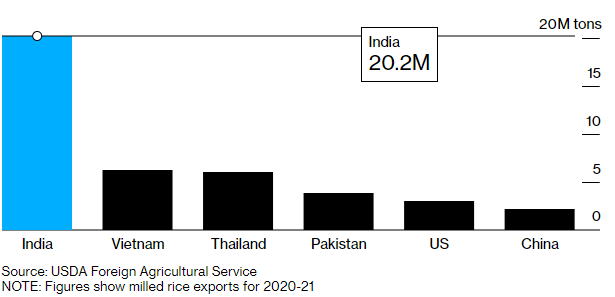May 21, 2025 | 05:40 GMT +7
May 21, 2025 | 05:40 GMT +7
Hotline: 0913.378.918
May 21, 2025 | 05:40 GMT +7
Hotline: 0913.378.918

India’s curbs on wheat and sugar exports sent shock waves through global markets as it marked an escalation in food protectionism that’s seen countries choke off flows of locally-grown supplies to the world. A similar move on rice by the No. 1 exporter at a time when crops like wheat and corn are soaring would threaten to plunge millions more into hunger and boost inflation risks.
“The government has already imposed restrictions on wheat exports; it’s a matter of time when restrictions on rice exports might be considered,” said Radhika Piplani, an economist at Yes Bank Ltd. The challenge will be to see if such curbs will lower food prices and within what time frame, she added.
Rice Giant
India is the world's biggest rice exporter, accounting for 40% of trade
The situation of rice stocks was discussed at the meeting of an inter-ministerial committee that tracks prices of essential commodities, according to a person familiar with the matter. But the committee decided there’s no need to restrict rice shipments for now because India has huge inventories, said the person, who asked not to be identified as the information is confidential.
A spokesperson who represents both the trade and food ministries didn’t immediately respond to an email seeking comment. The food secretary didn’t immediately respond to a request for comment.
“Restricting exports of rice is a possibility,” said Poornima Varma, assistant professor at the Centre for Management in Agriculture at the Indian Institute of Management, Ahmedabad. “The government may feel there’s a need to substitute wheat with rice to curb domestic inflation and safeguard food security,” she said.
Rice is closely related to wheat in Indians’ diet and the food ration system. Government purchases of wheat for the food aid program are expected to be less than half than year-ago levels and authorities plan to distribute more rice, spurring expectations that they will want to ensure ample supplies of cheap rice. India has stockpiled more than enough rice and prices have been stable.
“These public reserves of rice are more than adequate to meet the country’s public distribution needs, even with the enlargement of rice rations due to the prevailing wheat situation,” said Shirley Mustafa, an economist at UN Food and Agriculture Organization.
Rice has been the one staple grain that’s helping to keep the world food crisis from getting worse. Unlike wheat and corn, which have seen prices skyrocket as the war in Ukraine disrupts supplies from a major breadbasket, rice prices have remained subdued due to ample production and existing stockpiles.
That outlook can change if India decides to curb rice exports. It may spur other countries to follow a similar playbook, as it did during the 2008 food crisis, when Vietnam also restricted rice shipments. Asia produces and consumes about 90% of rice, with India accounting for 40% of global trade.
Bigger Food Crisis Can Be Averted If Asia Remembers Not to Panic
“Rice supplies are ample in the country and there is no need to ban or restrict exports,” said B.V. Krishna Rao, president of the Rice Exporters Association. “If the government still wants to impose a quantitative restriction it can be a political call and the trade will welcome that in the national interest.”
Economic leaders under Prime Minister Narendra Modi are taking a coordinated move to tackle inflation, seeking to slow price increases and ease the impact on consumers. Retail inflation, which is tracking at an eight-year high, is a politically-sensitive issue and can influence how people vote in elections.
History offers some guide on how a rice export curb might play out. During the 2007-08 food crisis, India faced soaring wheat prices and decided to limit exports. The government bought more rice for its food distribution program instead of wheat. To ensure cheap and plentiful supply of rice, officials blocked exports of non-Basmati rice in October 2007.
A decision to limit rice exports will depend on how prices fare in the coming weeks, said Suvodeep Rakshit, senior economist at Kotak Institutional Equities. Rice is about to be sown and output depends on the weather. If the monsoon is erratic and rice prices jump, it’s likely that exports will be curbed, he said.
Rice is identified by its length and shape. Basmati is a long-grain rice known for its distinct aroma. Basmati rice exports totaled 3.95 million tons in 2021-22 while non-basmati shipments reached 17.26 million tons.
(Bloomberg)

(VAN) Attempts to bring down the price of the Japanese staple have had little effect amid a cost-of-living crisis.

(VAN) Fourth most important food crop in peril as Latin America and Caribbean suffer from slow-onset climate disaster.

(VAN) Shifting market dynamics and the noise around new legislation has propelled Trouw Nutrition’s research around early life nutrition in poultry. Today, it continues to be a key area of research.

(VAN) India is concerned about its food security and the livelihoods of its farmers if more US food imports are allowed.

(VAN) FAO's Director-General emphasises the need to work together to transform agrifood systems.

(VAN) Europe is facing its worst outbreak of foot-and-mouth since the start of the century.

(VAN) The central authorities, in early April, released a 10-year plan for rural vitalization.